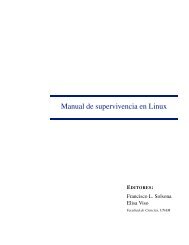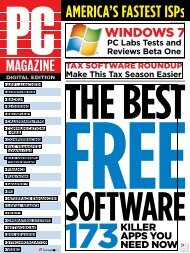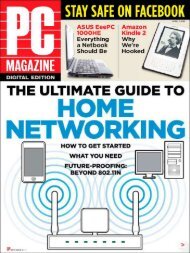frontsideWhile doctors, hospitals, and insurance companiesdrag their feet, the Web has stepped in.their medical records, fill prescriptions,get lab results, set up text-based pill alerts,and keep track of immunizations. The servicehas partnered with pharmacies likeWalgreens and CVS, as well as the AmericanHeart Association and medical testingfacility Quest Diagnostics. Users can optto share their information with such partners,but currently such sharing is an all-ornothingventure. You can’t choose to shareonly portions of your records (functionalityGoogle says is coming soon).For those who feel the Web opens theirmedical data to prying eyes, Roni Zeiger,Google Health product manager, says thatthe records entered into Google Healthremain completely private.“No Google Health user will ever findtheir health information as search results onGoogle,” Zeiger says. “That information isyours and only you have access to it.”Though Google Health has made a bigsplash, Microsoft has actually been in thegame longer, with its HealthVault. Alongwith storing medical records, HealthVaultalso lets you share those records as well asaccess health-related articles.A site named RememberItNow has takena slightly different tack. Instead of servingas an online filing cabinet for your medicalhistory, the site is geared toward caregivers.After uploading the medical recordsof a person you are caring for, you can useRememberItNow to track doctors’ appointmentsand remember medication schedules.The service uses e-mail and SMSreminders, as well as tracks overall wellbeingwith a health journal and other tools.The fee for this service is $24 a month.So how can such services exist amid thestrict HIPAA and state laws? Google Health’sinformation page states: “Unlike a doctor orhealth plan, Google Health is not regulatedby HIPAA. This is because Google does notstore data on behalf of health care providers.Instead, our primary relationship is with theuser.”—Chloe Albanesius, Errol Pierre-Louis,and Erik RheyBEST of the InternetEarth-Touch.comEarth-Touch.com is a Website that posts new naturevideos in both standard andHD. The site even has a tutorialthat shows you the differencebetween HD and SD, soyou can see what you’ve beenmissing.—Alan HenryuQueryuQuery lets you search theApple App Store from yourdesktop without having iTunesinstalled, and also allows youto filter your results based onpopularity, price, date, category,and more.—AHFlightCasterFlightCaster predicts flightdelays using an algorithm thatscours data on every domesticflight for the past 10 yearsand matches it to presentconditions. It even estimatesthe chances of delays.—ErrolPierre-Louis <strong>PC</strong> MAGAZINE DIGITAL EDITION NOVEMBER <strong>2009</strong>
The TruthAbout BroadbandAccording to a new study, “high-speed” Internetmay be an overstatement.The United States may be tops in a lot ofareas, but it turns out that broadbandaccessspeed is probably not one of them.This finding came to light as a result of anFederal Communications Commission( FCC ) t a s k forceprobe into the actualspeed of broadbandconnections acrossthe nation. This reportwill help the FCCbring a plan beforeCongress to spendallocated stimulusdollars.The study found that broadband speedsadvertised by ISPs are generally slower thanthey claim to be. Furthermore, the reportsays that the increasing number of users isputting stress on networks: About 1 percentof all users drive 20 percent of traffic and20 percent of all users drive 80 percent oftraffic. The task force also found that mostInternet applications are currently focusedon communication and entertainment, butthat is evolving into education, job training,business and other productive purposes.Currently, almost two-thirds of Americanshave broadband at home. About 33 percenthave access but have not adopted it, and 4percent said they have no access where theylive. The FCC says that getting broadband toeveryone should be a priority.“The cost of digital exclusion is large andgrowing for nonadopters,as resourcesfor employment, education,news, healthcare,and shopping forgoods and servicesincreasingly moveonline,” according tothe FCC.However, the commissiongoes on to say that if Americanswant more than one provider, guaranteedaccess to fixed and mobile service, or accessin rural areas, they should be prepared tosee the cost of broadband improvementincrease by a few billion dollars. Dependingon the type of speeds you want, investmentwill range from $20 billion for universal768-Kbps to 3-Mbps service all the way upto $350 billion for 100-Mbps service. For amore in-depth look at the FCC’s findings, thecommission has posted all 168 slides fromthe report on its Web site, which you canview by clicking here.—Chloe AlbanesiusNOVEMBER <strong>2009</strong> <strong>PC</strong> MAGAZINE DIGITAL EDITION







